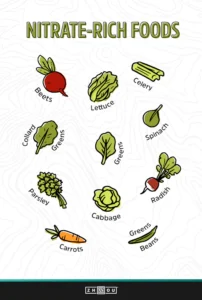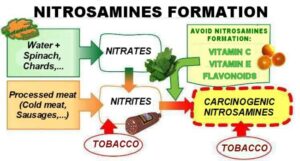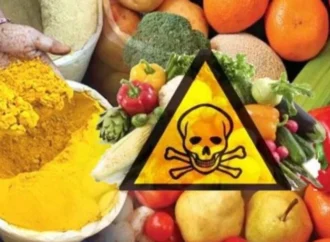Nitrates are chemicals that have become a growing concern for both human health and the environment. While they are essential for plant growth and naturally found in many foods, excessive nitrates or harmful forms can cause serious health issues. From contaminated water to processed meats, nitrates are pervasive, making it crucial to understand their risks. This article explores the sources, health benefits, and risks of nitrates, and how we can reduce their harmful impact.
What Are Nitrates?
Nitrates are inorganic compounds with the chemical formula NO3, made up of one nitrogen atom and three oxygen atoms. These compounds are highly soluble in water and play an important role in the nitrogen cycle, necessary for ecological balance. Plants use nitrates as a primary source of nitrogen for growth and photosynthesis. Humans are exposed to nitrates through diet, water, and environmental exposure.
Nitrates can convert into nitrites in the body, which can then form either beneficial compounds like nitric oxide or harmful compounds like nitrosamines. The impact of nitrates on health depends on their source and metabolism.
Sources of Nitrates
Nitrates are found in various natural and processed sources. While vegetables provide beneficial nitrates, processed foods and contaminated water can introduce harmful levels into our diet.
Natural Sources

Vegetables, especially green leafy and root vegetables, are rich in nitrates. These sources are generally safe and beneficial due to their antioxidant content. Examples include:
- Spinach: 741 mg per 100 grams
- Lettuce: 82 mg per 100 grams
- Broccoli: 40 mg per 100 grams
- Carrots: 0.1 mg per 100 grams
These vegetables support cardiovascular health and oxygen efficiency, providing additional nutrients like potassium, vitamin C, and fibre.
Added Nitrates in Processed Foods
Nitrates are commonly added to processed meats for preservation, colour enhancement, and flavour. When nitrates combine with proteins in meat, they can form nitrosamines, which are harmful compounds. Examples include:
- Ham: 1 mg per 100 grams
- Bacon: 5.5 mg per 100 grams
- Hot dogs: 9 mg per 100 grams
- Deli meats and sausages
Processed meats are major contributors to dietary nitrate intake and have been linked to increased risks of diseases like colorectal cancer. Reducing the intake of these foods is important.
Health Benefits of Nitrates
Nitrates, especially from vegetables, offer several health benefits:
Improved Heart Health
Nitrates convert into nitric oxide, which relaxes and dilates blood vessels, improving circulation and lowering blood pressure. This helps reduce the risk of heart diseases, including hypertension and strokes.
Enhanced Athletic Performance
Nitric oxide boosts oxygen efficiency and endurance, enhancing physical performance. Nitrate-rich foods like beets and spinach can reduce fatigue and increase stamina, making physical exertion easier.
Better Oxygen Efficiency
Nitrates improve blood flow, increasing oxygen delivery to muscles and tissues, which helps maintain energy levels during intense physical activities.
Boosted Metabolism
Nitrates enhance metabolic efficiency, supporting better digestion, nutrient absorption, and hormone regulation.
Improved Cognitive Function
Increased nitric oxide levels improve blood flow to the brain, leading to better mental clarity and memory. This is especially beneficial for older adults, potentially reducing age-related cognitive decline.
Support for Muscle Recovery
Nitrates improve circulation and nutrient delivery, leading to quicker recovery and less muscle soreness after exercise.
Risks of Nitrates

Excessive exposure to nitrates, especially from processed foods and contaminated water, can lead to health risks:
- Cancer Risk: Nitrates can form nitrosamines in the stomach, which are carcinogenic and linked to digestive cancers like colorectal and gastric cancers.
- Blue Baby Syndrome: High nitrate levels in drinking water can cause methemoglobinemia in infants, impairing oxygen delivery to tissues.
- Pregnancy Complications: Excessive nitrate exposure may lead to developmental risks during pregnancy.
- Thyroid Dysfunction: Chronic high nitrate intake can interfere with iodine uptake, leading to thyroid issues.
Reducing Nitrate Risks
To reduce nitrate exposure, consider the following:
- Limit Processed Meats: Reduce consumption of bacon, hot dogs, and deli meats.
- Choose Nitrate-Free Options: Opt for nitrate-free or naturally cured meats.
- Cook Safely: Avoid high-temperature cooking methods like frying or grilling to prevent nitrosamine formation.
- Consume Antioxidants: Include foods rich in vitamin C to prevent harmful transformations of nitrates.
- Monitor Water Quality: Use water filters to reduce nitrate levels in drinking water.
- Diversify Your Diet: Balance nitrate intake with a variety of nutrient-rich foods.
Small changes, such as choosing fresh, unprocessed foods and cooking with safe methods, can significantly reduce nitrate-related health risks.
Nitrates vs Nitrites
Nitrates and nitrites are closely related compounds with different health impacts.
Nitrates (NO₃⁻)
- Sources: Found in vegetables, water, and soil; also added to processed meats.
- Health Effects: Generally safe from vegetable sources and linked to heart health benefits. Excessive exposure to water or processed foods can be harmful.
Nitrites (NO₂⁻)
- Sources: Formed from nitrates in the body and food; common in processed meats.
- Health Effects: Can form cancer-causing nitrosamines when exposed to heat. High nitrate levels in infant water can cause Blue Baby Syndrome.
Key Differences
Nitrates from vegetables are generally safer, while nitrites, especially from processed meats, pose cancer risks.
Regulatory Guidelines
- Nitrates: 0 to 3.7 mg/kg body weight per day
- Nitrites: 0 to 0.07 mg/kg body weight per day
Regulatory agencies recommend testing water quality and encouraging natural preservation methods to reduce synthetic nitrate and nitrite use.
Conclusion
Nitrates are essential compounds that can have both positive and negative effects, depending on their source and metabolism. Naturally occurring nitrates in vegetables promote heart health, while nitrates in processed meats can increase cancer risks. By making informed dietary choices, using safe cooking practices, and consuming antioxidants, we can enjoy the health benefits of nitrates while minimizing their risks.
The rising levels of nitrates in water and processed foods present challenges for both public health and environmental safety. To address this, we need to adopt solutions such as better agricultural runoff management, improved water treatment, and natural food preservation methods. These proactive measures will help protect both health and the environment, ensuring that nitrates remain beneficial rather than harmful.
 Food Manifest
Food Manifest 


















